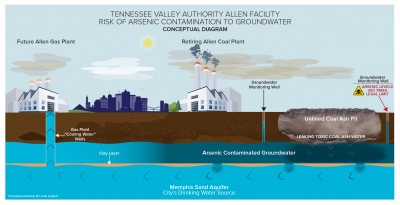SELC challenges TVA plan that risks polluting Memphis drinking water source with arsenic
SELC, on behalf of Protect Our Aquifer and the Sierra Club, sent a letter Wednesday demanding that the Tennessee Valley Authority (TVA) reconsider its plan to use the city’s only source of drinking water for a cooling system at its Allen natural gas plant. Groups want the federal utility to find a more reasonable and responsible alternative source of cooling water based on significant new information about the risk of arsenic contamination to Memphis’ clean water supply. SELC and partners insist that TVA must revisit its plans and allow the public to weigh in on other options.
At its Allen facility outside of Memphis, TVA recently built a gas plant less than half a mile from an unlined, leaking coal ash pits at its coal plant slated for retirement in 2018. Originally planning to utilize recycled gray water from a nearby wastewater treatment plant to cool the new gas plant, TVA later changed course, without public input, and decided to withdraw cooling water on-site directly from the Memphis Sand Aquifer. One local professor explained the Memphis Sand this way: “It’s one of the best (aquifers) in the world in terms of thickness (and) quality of water.”
With arsenic showing up at 300 times the legal limit in monitoring wells near TVA’s coal ash pits, the issue is running massive new wells could draw that pollution into Memphis’ drinking water source.
Arsenic and Old Waste
Dangerous toxins leaking from the Allen coal ash pits have contaminated groundwater that sits directly above the city’s drinking water aquifer with high levels of arsenic and other toxins. In one area, arsenic levels register more than 300 times the legal limit. TVA’s contamination violates federal and state laws that protect clean water and prohibit open dumping of coal ash. Citizens, community leaders, and scientific experts are concerned that when TVA turns on its cooling wells at the gas plant, this arsenic-contaminated groundwater under the nearby coal ash pit will be pulled directly into the city’s only source of drinking water, spreading the toxic contamination.
“TVA has been pursuing a reckless course while turning a blind eye to the risk of polluting Memphis’ primary source of drinking water,” said SELC attorney Amanda Garcia. “TVA should have considered the local communities who depend on the Memphis Sand Aquifer as a source for safe, reliable drinking water. Instead, the federal utility has disregarded the risks and the law to save itself a few bucks.”
In November 2016, TVA began detecting arsenic levels more than 300 times the legal limit at the Allen coal plant but waited six months, until May 2017, to report the results to the state. Meanwhile, TVA defended permits it had obtained from Shelby County to drill cooling wells for the Allen gas plant without disclosing or analyzing the extent of the arsenic contamination.
TVA has known about elevated levels of arsenic contamination of groundwater at its Allen coal plant and the high risk of leaking into the Memphis Sand since the 1980s,” said SELC attorney Anne Passino. “Some more recent monitoring reports have shown arsenic at even higher levels. Given what we know now, it’s truly remarkable that TVA would apply for and defend permits to drill into the Memphis Sand Aquifer without analyzing this risk. Contamination issues that fly under the radar don’t cease to exist.
After reporting the arsenic issues at the Allen site to the state’s environmental agency, Tennessee Department of Environment and Conservation (TDEC), TVA was required to study the potential impact of the cooling wells on the Memphis Sand Aquifer and the risk of contaminated groundwater infiltrating the aquifer. In October 2017, TVA performed a short pump test, limited to 24-hours, to check if the wells would immediately pull polluted groundwater into the city’s primary source of drinking water. These test results were supposed to be submitted to TDEC at the end of October 2017. However, TVA has delayed reporting the pump test results to the state and public for over five months and now plans to submit them by March 6.
We have the right to know about any decisions that could possibly put our drinking water at risk, and cutting corners behind closed doors to the detriment of the Memphis Sand Aquifer is simply unacceptable,” said Ward Archer, President of Protect Our Aquifer. “As a federal agency, TVA should be acting in the best interests of the public, not delaying or hiding test results from us. It’s time for TVA to be honest and transparent with the citizens of Memphis about what’s happening at Allen and the risks imposed on our water supply.
Scott Banbury, Conservation Coordinator for the Tennessee Chapter of the Sierra Club, shared a similar sentiment.
“TVA needs to stop being irresponsible and reevaluate the risk of contaminating our city’s drinking water supply with dangerous toxins. You can keep your coal ash out of our water. We don’t want it.”
